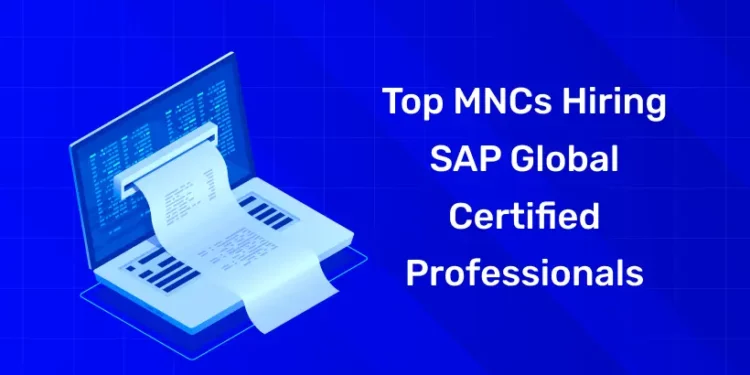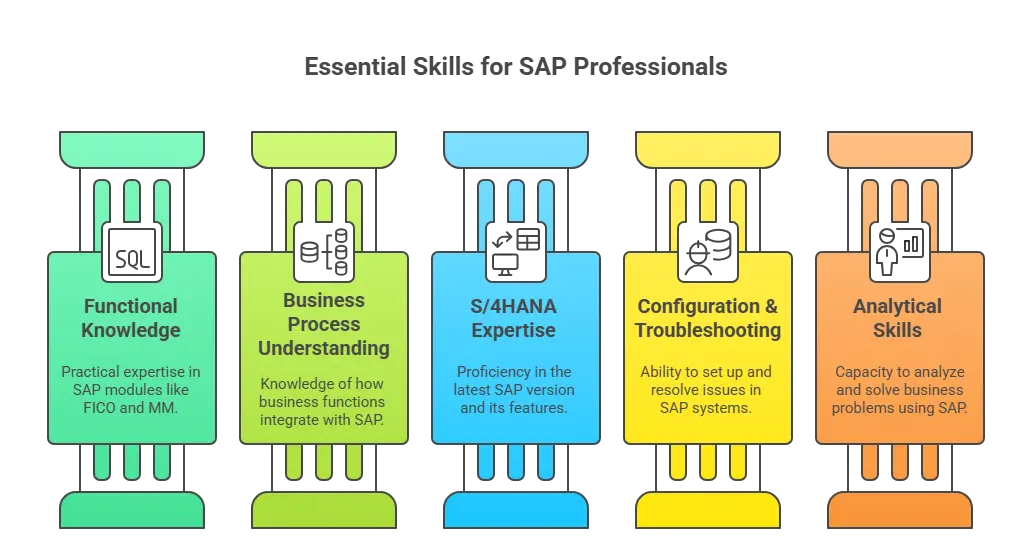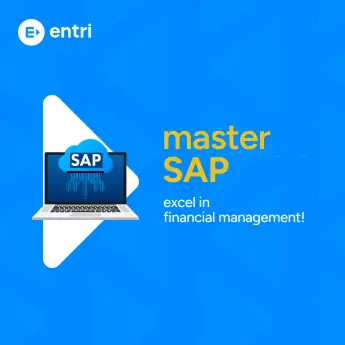Table of Contents
If you’re planning to build a strong career in the SAP domain, getting an SAP Global Certification can open doors to some of the world’s biggest companies. Today, many top MNCs actively look for certified professionals because they trust the skills, knowledge, and hands-on expertise that SAP certification ensures. Whether you’re a fresher or an experienced candidate, this certification gives you a clear advantage and increases your chances of getting hired by leading global organizations.
Join Entri’s SAP FICO Training Course today!!
Introduction to SAP Global Certification
SAP Global Certification is a recognized credential that proves your skills in using SAP technologies. It helps you stand out in the job market and builds trust with employers. Whether you want to start a career in ERP, finance, HR, supply chain, or analytics, SAP certification gives you a strong foundation and makes you job-ready for global opportunities.
What is SAP Global Certification?
SAP Global Certification is an official exam and qualification provided by SAP to validate your knowledge in a specific SAP module or role. When you complete the certification, it shows that you understand how SAP systems work and that you can apply these skills in real business situations. This certification is accepted worldwide and is valuable for both beginners and experienced professionals.
Why companies prefer SAP-certified talent?
Companies prefer SAP-certified professionals because certification proves that you have the right skills and are ready to work on SAP projects without needing extensive training. It builds confidence that you can handle tasks correctly, follow best practices, and deliver high-quality work. Certified candidates also adapt faster to projects, which helps companies save time and resources.
Demand for SAP skills in the global job market
The demand for SAP skills is growing rapidly because more companies are switching to digital systems and need experts to manage finance, supply chain, HR, data, and operations. SAP is used by thousands of big brands worldwide, so skilled professionals are always in demand. As businesses upgrade to SAP S/4HANA and cloud platforms, certified professionals have even better job opportunities and higher salary prospects.
Why MNCs Prefer SAP-Certified Professionals
1. Standardized skill validation
When a candidate is SAP-certified, companies immediately know that the person has learned the required skills in a structured and standard way. Certification acts as a trusted proof that you understand how SAP works and can handle real tasks confidently. Instead of guessing your knowledge level, employers get a clear and verified assurance of your skills.
2. Faster onboarding & project readiness
SAP-certified professionals usually understand the basics, system navigation, and business processes even before joining a company. This helps them adapt quickly to new projects and reduces the time needed for training. MNCs prefer certified candidates because they can start contributing to the team and projects much sooner compared to those who need complete training from scratch.
3. Increased reliability and reduced training cost
Hiring a certified professional lowers the company’s risk. Employers know that certified candidates are less likely to make major mistakes because they already know SAP best practices. This reduces the need for long internal training programs, saving the organization both time and money. Certified employees also tend to be more confident and independent in their role.
4. Alignment with global SAP best practices
SAP continuously updates its technologies, and certified professionals are trained on these latest versions and methods. This means they follow globally accepted SAP standards, workflows, and processes. MNCs benefit from this because consistent and standardized work helps maintain quality across different teams, countries, and projects.
Master SAP with Expert-Led Courses
Unlock your potential with our comprehensive SAP courses! Learn essential modules like SAP MM (Materials Management), SAP SD (Sales and Distribution), and SAP FICO (Financial Accounting and Controlling) from industry experts.
Know MoreTop MNCs Hiring SAP Global Certified Professionals
Many leading global companies actively hire SAP-certified professionals because they need skilled experts who can manage, implement, and support SAP systems. These MNCs prefer certified candidates as they are job-ready, understand SAP best practices, and can contribute to projects from day one. From consulting firms to IT giants and global enterprises, SAP-certified professionals get access to better roles, higher salaries, and international opportunities.
1. Accenture
Accenture is one of the biggest companies offering SAP consulting to clients around the world. They work on large digital transformation projects, so they regularly hire SAP-certified professionals. You can find roles such as SAP Consultant, SAP Support Engineer, and SAP Functional Analyst. Because Accenture has offices in many countries, certified candidates also get the chance to work on international projects.
2. Deloitte
Deloitte helps companies upgrade or improve their SAP systems. They hire certified professionals for many SAP modules like FICO, MM, SD, HCM, and S/4HANA. Their projects focus on solving business problems using SAP, so certified candidates are preferred for both technical and functional roles.
3. IBM
IBM has a strong SAP practice and supports clients in implementing and maintaining SAP systems. They especially hire for SAP + Cloud combinations, such as SAP on AWS, Azure, or IBM Cloud. Certified professionals are preferred because IBM focuses on new technology solutions and expects candidates to be job-ready.
4. Capgemini
Capgemini works heavily on SAP S/4HANA and SAP Analytics projects. They hire freshers as well as experienced professionals. Freshers with SAP certification get added advantage because the company wants candidates who understand SAP’s latest technologies.
5. Infosys
Infosys hires SAP-certified professionals for consulting, automation, and digital transformation roles. They offer good career growth where employees can move from junior consultants to senior solution experts. Certification helps candidates stand out during hiring.
6. TCS (Tata Consultancy Services)
TCS is one of the largest SAP partners across the world. They work on SAP implementation, support, and upgrade projects for clients in banking, retail, manufacturing, and healthcare. SAP-certified professionals get opportunities to work on global projects and long-term client programs.
7. Wipro
Wipro supports clients in digital transformation and often uses SAP solutions to modernize business operations. They hire certified candidates across SAP modules like FICO, MM, SD, ABAP, HCM, and SuccessFactors. Certification helps candidates get placed in specialized project teams.
8. HCLTech
HCLTech focuses on SAP S/4HANA migration and support services. They often prefer certified freshers because certification proves that the candidate understands real SAP concepts. They offer roles like SAP Support Associate, SAP Consultant, and SAP Technical Analyst.
9. EY (Ernst & Young)
EY uses SAP mainly for audit, advisory, and business consulting services. They have high demand for certified SAP FICO, MM, SD, and GRC professionals. As an advisory-based company, EY prefers candidates who have certification because it shows credibility and strong knowledge.
10. PwC
PwC helps clients adopt SAP for finance, operations, and technology transformation. They prefer certified professionals because their projects require strong domain knowledge and SAP expertise. SAP FICO, PP, MM, and S/4HANA are some of the most hired areas.
11. SAP Labs
SAP Labs is the official development center of SAP. They hire certified candidates for product development, quality testing, and technical support roles. Working here allows professionals to be part of SAP’s actual product innovation.
12. Tech Mahindra
Tech Mahindra works on SAP ERP solutions for telecom and manufacturing companies. They hire SAP-certified professionals for system integration, support, testing, and upgrade projects. Roles are available in both technical and functional modules.
13. Cognizant (CTS)
Cognizant hires certified SAP professionals for support, enhancement, and implementation projects. They work with global clients and offer stable career paths in SAP functional and technical areas.
14. Oracle + SAP Hybrid Roles
Some companies use both Oracle and SAP systems together. In such cases, they hire professionals who understand SAP but can also support Oracle-based processes. Certification helps candidates work in hybrid ERP environments.
15. Amazon, Walmart & Other Global Enterprises
Large companies like Amazon and Walmart use SAP for supply chain, inventory, finance, HR, and analytics. They hire SAP-certified professionals for roles like SAP Analyst, SAP Support Engineer, and SAP Functional Consultant. Certification helps because these companies want skilled professionals who can handle complex, large-scale systems.
Popular SAP Modules MNCs Hire For
1. SAP FICO (Finance & Controlling)
SAP FICO experts handle a company’s finance and accounting activities. They work on budgeting, payments, balance sheets, tax reports, and financial analysis. MNCs hire FICO professionals because they help maintain accurate financial records and support better business decisions.
2. SAP MM (Materials Management)
SAP MM focuses on purchasing, vendors, inventory, and material handling. MM professionals ensure that the company buys the right materials at the right time and manages stock properly. MNCs need MM experts to streamline their supply chain and reduce costs.
3. SAP SD (Sales & Distribution)
SAP SD professionals work with sales orders, billing, shipping, and customer management. They help ensure smooth sales operations from order placement to delivery. MNCs hire SD experts to improve customer satisfaction and sales performance.
4. SAP ABAP (Advanced Business Application Programming)
SAP ABAP professionals are programmers who customize SAP systems. They create new features, fix issues, and enhance existing applications. MNCs depend on ABAP developers to tailor SAP systems to their business needs.
5. SAP Basis & Security
SAP Basis teams manage system performance, backups, and technical support. Security experts protect sensitive data and manage user access. MNCs need these professionals to keep SAP systems running smoothly and safely.
6. SAP HCM (Human Capital Management)
SAP HCM manages employee data, payroll, attendance, and HR processes. HCM professionals help companies handle workforce-related tasks efficiently. MNCs hire HCM experts to ensure smooth HR operations.
7. SAP SuccessFactors (Cloud HR)
SuccessFactors is SAP’s cloud-based HR platform used for talent management, recruitment, onboarding, and performance tracking. Companies prefer SuccessFactors experts because it helps them manage employees more effectively with modern tools.
8. SAP BW/BI (Business Warehouse / Business Intelligence)
BW/BI professionals work with data reporting, dashboards, and analytics. They help companies turn raw data into meaningful insights. MNCs hire them to support data-driven decision-making.
9. SAP S/4HANA
S/4HANA is SAP’s latest and fastest ERP system. Professionals working in this module help companies upgrade from older systems and manage real-time business operations. Demand for S/4HANA experts is very high as most MNCs are moving to this platform.
10. SAP PP (Production Planning)
SAP PP focuses on manufacturing planning, production scheduling, and workflow management. MNCs hire PP experts to improve their production efficiency and reduce delays in manufacturing.
11. SAP Ariba
SAP Ariba deals with procurement, supplier management, and online buying/selling. Ariba professionals help companies manage their vendors and purchases through cloud-based tools. MNCs prefer Ariba experts to simplify procurement processes.
12. SAP EWM (Extended Warehouse Management)
SAP EWM professionals manage warehouse operations like picking, packing, storage, transportation, and inventory. They help improve warehouse speed and accuracy. Companies with large warehouses often hire EWM specialists.
Job Roles Offered by MNCs
1. SAP Consultant
An SAP Consultant helps companies use SAP in the best way for their business. They understand the company’s needs, customize SAP solutions, solve issues, and guide teams during implementation. MNCs hire SAP consultants because they help make processes faster, easier, and more efficient.
2. SAP Business Analyst
SAP Business Analysts act as a bridge between the business team and the technical team. They study business problems, understand requirements, and translate them into SAP solutions. MNCs need business analysts to ensure SAP systems match real business needs.
3. SAP Developer / ABAP Developer
An SAP ABAP Developer writes code, builds applications, and customizes SAP features. They create reports, forms, workflows, and tools that companies need. MNCs hire ABAP developers to modify SAP systems according to their unique processes.
4. SAP Functional Consultant
A Functional Consultant specializes in a specific SAP module like FICO, MM, SD, or HCM. They work with end users, configure the system, test features, and support business operations. MNCs prefer functional consultants because they bring deep knowledge of their module.
5. SAP Basis Administrator
SAP Basis Administrators take care of the technical side of SAP systems. They manage installations, system performance, backups, upgrades, and security. MNCs hire Basis experts to ensure that SAP systems run smoothly without downtime.
6. SAP Project Manager
SAP Project Managers oversee large SAP projects from start to finish. They plan the timeline, manage teams, coordinate with clients, and ensure the project is delivered on time. MNCs need SAP project managers to lead complex SAP implementations.
7. SAP Support Engineer
SAP Support Engineers help users solve day-to-day SAP issues. They troubleshoot errors, fix bugs, and ensure the system is working properly. MNCs rely on support engineers to maintain smooth operations across departments.
8. SAP Data Migration Specialist
Data Migration Specialists move data from old systems to new SAP systems. They clean, map, and upload data safely without losing information. MNCs need these specialists during SAP upgrades or new implementations.
Master SAP with Expert-Led Courses
Unlock your potential with our comprehensive SAP courses! Learn essential modules like SAP MM (Materials Management), SAP SD (Sales and Distribution), and SAP FICO (Financial Accounting and Controlling) from industry experts.
Know MoreSkills MNCs Expect from SAP-Certified Professionals
1. Functional knowledge + hands-on practical skills
MNCs want SAP-certified professionals who not only understand the concepts but also know how to use the system in real situations. They expect candidates to work confidently on modules like FICO, MM, SD, HCM, etc., and perform daily tasks such as creating reports, configuring settings, and supporting users. Practical skills matter more than just theory.
2. Business process understanding
SAP is built around real business processes. So, companies look for professionals who understand how finance, sales, purchasing, HR, or supply chain works. This helps employees connect SAP features with actual business needs and solve problems more effectively.
3. S/4HANA expertise
Most MNCs are moving to SAP S/4HANA, which is the latest and fastest version of SAP. They prefer candidates who understand S/4HANA features, Fiori apps, and real-time data processing. Having S/4HANA skills makes professionals more valuable and increases job opportunities.
4. Configuration & troubleshooting
Companies expect SAP professionals to configure the system based on requirements and fix issues when something goes wrong. Whether it is updating settings, correcting errors, or improving workflows—troubleshooting skills help maintain smooth operations.
5. Analytical and problem-solving skills
MNCs want people who can analyze problems, find the root cause, and apply SAP solutions to fix them. Good analytical skills help in reporting, decision-making, and improving business processes using SAP tools.
Freshers vs Experienced Roles in MNCs
Entry-level opportunities for SAP-certified freshers
SAP-certified freshers usually begin their careers in junior or support-based roles. These roles help them understand how SAP works in real companies. Freshers assist senior consultants, handle basic tasks, and slowly grow their confidence.
Some common entry-level roles include:
- SAP Support Associate – helping users solve simple issues.
- Junior Functional Consultant – working on basic configuration and testing.
- SAP Analyst / Trainee – learning business processes and supporting daily operations.
MNCs hire certified freshers because they already understand SAP fundamentals and require less time to train. These roles give freshers a chance to work on real projects, learn from experts, and build a strong foundation for future growth.
Lateral entry options for experienced candidates
Experienced professionals with strong SAP skills can join MNCs directly in mid-level or senior roles. These roles come with higher responsibilities, more client interaction, and deeper involvement in project planning and decision-making.
Experienced candidates may join as:
- SAP Functional Consultant – managing detailed configuration and client requirements.
- SAP Technical Consultant / ABAP Developer – building custom solutions.
- SAP Project Lead or Module Lead – guiding teams and managing project tasks.
- SAP Solution Architect – designing end-to-end SAP solutions for businesses.
MNCs prefer experienced SAP professionals because they bring practical knowledge, can handle complex issues, and contribute immediately to ongoing projects. Lateral hires often work on large implementations, migrations, and S/4HANA transformation projects.
Salary Trends in MNCs for SAP Professionals
1. Average salary for freshers
SAP-certified freshers generally earn higher starting salaries compared to many other IT beginners. In most MNCs, freshers can expect a salary range of ₹3.5 LPA to ₹6 LPA, depending on the module, certification, and company. Modules like SAP FICO, MM, SD, and HCM offer good starting packages, while technical roles like ABAP can offer even higher starting salaries.
2. Salary by experience level
As professionals gain more hands-on experience, their salaries grow quickly.
- 1–3 years experience: ₹5 LPA – ₹10 LPA
- 3–6 years experience: ₹9 LPA – ₹18 LPA
- 6–10 years experience: ₹15 LPA – ₹25 LPA
- 10+ years experience: Can go up to ₹30 LPA or more, especially for roles like Project Manager, Architect, or Lead Consultant.
Experience plays a major role because SAP projects require strong problem-solving and deep functional knowledge.
3. Salary by SAP module
Different SAP modules offer different salary ranges. Some modules have higher demand depending on industry needs.
- SAP FICO, SD, MM: Moderate to high salary growth due to wide usage.
- SAP ABAP: Strong starting salary because it requires programming skills.
- SAP HCM & SuccessFactors: High demand in HR tech; good salary growth.
- SAP S/4HANA: Highest-paying module because companies are migrating to S/4HANA.
- SAP Ariba, EWM, BW/BI: Good demand in supply chain and analytics, offering attractive packages.
4. Salary differences between service & product-based companies
Salaries can vary depending on the type of company:
Service-based MNCs (TCS, Infosys, Wipro, HCL)
- Offer steady salaries with structured growth.
- Freshers start lower but get stable career opportunities.
Product-based companies (SAP Labs, Oracle, Amazon, Walmart)
- Offer higher salaries because work is more specialized.
- Strong demand for deep expertise and problem-solving skills.
- Packages can be 20–40% higher compared to service companies.
Overall, SAP professionals earn competitive salaries in both types of companies, but product-based companies usually pay more due to advanced technical requirements.
How to Increase Your Chances of Getting Hired by MNCs
1. Get certified in the right module
Choosing the right SAP module is the first step. Pick a module that matches your background or interest—like FICO for finance, MM for supply chain, HCM for HR, or ABAP for programming. Getting SAP Global Certification shows companies that you have verified skills and are serious about building a career in SAP.
2. Build hands-on experience
MNCs prefer candidates who have practical experience. Try working on SAP practice systems, online hands-on labs, or training programs that offer real-time exercises. The more you practice, the more confident you become in solving real problems, which helps you stand out in interviews.
3. Create a strong SAP resume
A good SAP resume should highlight your certification, skills, projects, tools you have used, and module knowledge. Keep it clean and easy to read. Mention practical tasks like configuration, testing, ticket handling, mapping, or data upload to show your real abilities.
4. Work on real-time projects/case studies
Even if you are a fresher, you can learn a lot by working on mini-projects or case studies related to your SAP module. These projects help you understand real business scenarios and give you confidence during interviews when companies ask practical questions.
5. Learn SAP S/4HANA
Most MNCs are moving to S/4HANA, SAP’s newest and most advanced ERP platform. Learning S/4HANA concepts, Fiori apps, and new functionalities gives you a big advantage. Candidates with S/4HANA skills are preferred for both fresher and experienced roles.
6. Network with SAP professionals
Join SAP communities, LinkedIn groups, webinars, and workshops. Connecting with SAP professionals helps you learn industry trends, get mentorship, and even find job referrals. Networking is one of the fastest ways to grow in the SAP field.
Future Scope of SAP-Certified Careers in MNCs
1. Cloud-based SAP systems
The future of SAP is moving strongly toward the cloud. Companies are shifting from traditional on-premise systems to cloud platforms like SAP S/4HANA Cloud, SAP SuccessFactors, and SAP Ariba. This creates huge demand for professionals who understand cloud technologies, migrations, and modern SAP tools.
For SAP-certified professionals, this means more job opportunities, higher salaries, and the chance to work on global cloud transformation projects.
2. SAP automation & AI integration
SAP is now integrating automation, machine learning, and artificial intelligence into its systems. Features like SAP Intelligent RPA, AI-driven analytics, and predictive insights help companies automate tasks and make smarter decisions.
Professionals who understand these new technologies will be in high demand. MNCs are already looking for SAP experts who can combine traditional SAP skills with automation and AI knowledge.
3. Growing need for digital transformation experts
Every industry—finance, retail, manufacturing, logistics, and healthcare—is undergoing digital transformation. SAP is at the center of this change.
This means SAP-certified professionals will continue to have strong career opportunities as companies rely on SAP experts to upgrade old systems, improve business processes, and implement modern digital solutions.
As more businesses adopt S/4HANA, cloud solutions, and data-driven decision-making, the demand for SAP talent will only increase.
Join Entri’s SAP FICO Training Course today!!
Conclusion
SAP Global Certification, combined with the right practical skills, can significantly boost your chances of getting hired by top MNCs around the world. Certified professionals are trusted for their knowledge, hands-on abilities, and understanding of real business processes. With growing demand for SAP experts, especially in areas like S/4HANA, cloud solutions, and digital transformation, the career opportunities are only getting stronger. Whether you are a fresher or an experienced professional, the right SAP training, certification, and continuous learning can open doors to high-paying roles, global projects, and long-term career growth in some of the world’s biggest companies.
| Related Links | |
| Which SAP Module Is Best for Freshers | Top Companies Using SAP Software in India |
| Which SAP Module is Best for Logistics | Top SAP Interview Questions and Answers |
Master SAP with Expert-Led Courses
Unlock your potential with our comprehensive SAP courses! Learn essential modules like SAP MM (Materials Management), SAP SD (Sales and Distribution), and SAP FICO (Financial Accounting and Controlling) from industry experts.
Know MoreFrequently Asked Questions
Which MNCs hire SAP Global Certified professionals?
Many leading companies hire SAP-certified talent, including Accenture, Deloitte, IBM, TCS, Infosys, Wipro, Capgemini, EY, PwC, HCLTech, Cognizant, and SAP Labs. Global enterprises like Amazon, Walmart, and Siemens also hire SAP experts for roles in finance, supply chain, HR, and analytics.
Do MNCs prefer certified candidates over non-certified ones?
Yes. SAP Global Certification acts as proof that you have verified skills and knowledge. It gives recruiters confidence that you understand SAP tools, business processes, and best practices. While certification alone is not enough, it gives you a strong advantage during shortlisting.
What SAP modules are most in demand among MNCs?
Modules like SAP FICO, MM, SD, ABAP, Basis, HCM, SuccessFactors, S/4HANA, Ariba, BW/BI, and EWM have high demand in MNCs. Among these, S/4HANA skills are currently the most preferred because companies are upgrading their systems.
Can freshers with SAP certification get jobs in MNCs?
Yes, many MNCs hire certified freshers for junior roles such as SAP Support Associate, Analyst, Junior Consultant, or Trainee. Freshers are usually placed in support, testing, basic configuration, and documentation tasks until they gain more experience.
What job roles do certified professionals get in top MNCs?
SAP-certified professionals can work as SAP consultants, functional consultants, ABAP developers, business analysts, project managers, Basis administrators, support engineers, and data migration specialists. Your exact role depends on your module and experience level.
What skills do MNCs expect from SAP-certified professionals?
MNCs look for strong functional knowledge, hands-on practical experience, business process understanding, configuration skills, troubleshooting ability, and familiarity with S/4HANA. Good communication and problem-solving skills are also important for working with global teams.
Does SAP certification guarantee a job in an MNC?
Certification greatly improves your chances, but it does not guarantee a job. You need a combination of SAP skills, real-time project practice, a strong resume, and good interview preparation. When you combine certification with hands-on learning, your chances of getting selected increase significantly.












